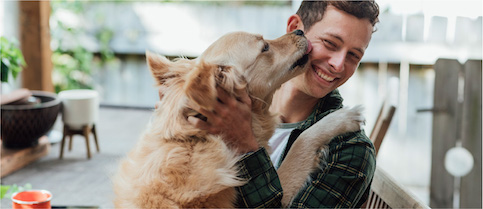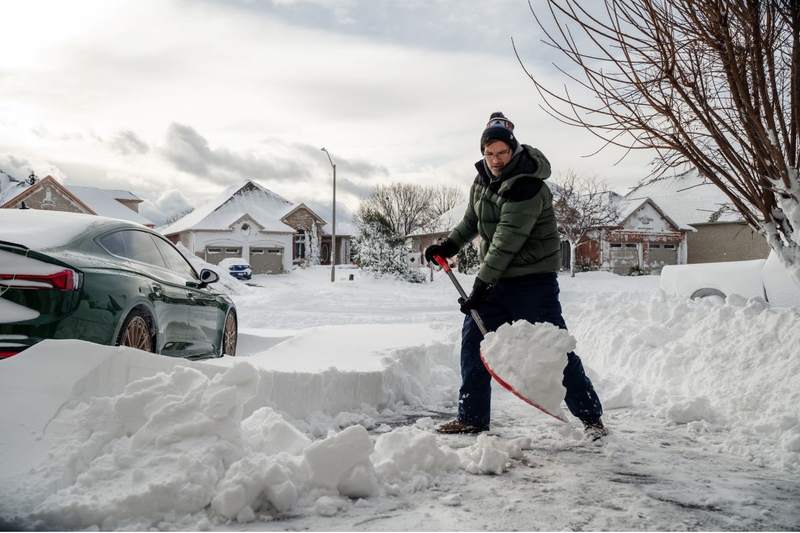Our pets are like family, so it makes sense that we would want to offer them insurance protection just like we would purchase for our family members.
While many pet owners choose to purchase pet health insurance to keep their companion safe in the event of a health emergency, what about instances when your pet causes damage to others?
That’s where homeowners insurance comes in. When it comes to homeowners insurance and dogs, it offers liability protection for those situations that seem unimaginable until they happen, such as your pup biting another person.
When it comes to homeowners insurance and pets, there are many considerations to determine whether your pet is covered or not. To help you navigate the intricacies of homeowners insurance and pets, we created this guide to help answer the most common pet-related homeowners insurance questions so you can make an informed decision about the best option for you and your best four-legged (or two-legged!) pal.
Table of Contents
Are Pets Covered Under Homeowners Insurance?
Yes, certain pets are covered under homeowners insurance. However, as is the case with many insurance questions, whether your pet is covered under your homeowners insurance depends on a variety of factors.
Whether you’re a current homeowner who’s a new pet parent or you’re a first-time home buyer, it’s helpful to understand how homeowners insurance relates to your pets and the types of claims that they may prompt.
Most homeowners insurance policies include the following types of coverage:
- Structure of your home (Dwelling)
- Personal belongings
- Liability protection
- Medical payments to others
- Additional living expenses (A.L.E.)
Homeowners insurance policies rarely offer a specific “pet insurance coverage” within the plan. Instead, your home insurance policy will help you with liability and medical payments that can protect you from expensive bills associated with dog bites and other injuries or damages caused by your pet.
There are some limitations, however. Some insurance companies specifically exclude dog bites or coverage for certain breeds. And, if you haven’t told your insurance company about your dog and then try to file a claim, they might deny the claim.
Does Homeowners Insurance Exclude Any Pets From Coverage?
The short answer is yes. While it varies company by company, there are some pets that are considered too much of a risk to offer coverage for in the event that they cause damage to your home or another person. These types of pets may be eligible for limited coverage or no coverage at all.
In general, most insurance companies consider a pet to be a dog or a cat. Certain breeds of both dogs and cats may not be covered by your insurance company if they are deemed dangerous. If you have a non-traditional house pet such as a ferret or snake, those will likely be considered “exotic pets,” which may also be excluded from certain homeowners insurance plans.
What Pet-Related Issues Does Homeowners Insurance Not Cover?
Homeowners insurance typically kicks in to cover damage your pet causes to another person or their property. Homeowners insurance does not typically offer coverage if your precious pup rips your carpet to shreds or chews your door frame to pieces.
Before deciding on an insurance policy, it’s important to check to see what pet-specific endorsements it offers. Most insurance companies will deny any coverage for damages inflicted by pets on your property or those covered by your policy.
What To Do If You’re Denied Coverage Because Of Your Pet
If you are denied coverage because of your pet, there are steps you can take to secure coverage for your furry (or feathered, scaled, etc.) family member.
- Shop around for other providers: Not all insurance companies deny coverage for certain pets or pet breeds. Do your research to find a company that may offer coverage for your pet.
- Do a pet DNA test: If your insurance company denied your pet coverage because they were deemed a dangerous breed, you could submit a pet DNA test to identify exactly what breed your dog is. Some insurance companies allow coverage for animals that are mixed breeds depending on the percentage of the mix represented by each breed.
- Purchase additional coverage: If your pet is denied coverage because it’s deemed a dangerous animal or an exotic pet, you can ask about pet liability coverage options. These will likely come with higher premiums, but will offer you protection against unexpected pet-related accidents.
- Get your dog additional training: If you can prove that you took your dog to classes that will help modify its behavior, some insurers will decide to cover a dog. Additionally, if you agree to restrain your dog with a muzzle or chain, some insurers will decide to extend coverage.
See What You Qualify For
Buy A Home
Discover mortgage options that fit your unique financial needs.

Refinance
Refinance your mortgage to have more money for what matters.
Tap Into Equity
Use your home’s equity and unlock cash to achieve your goals.
Homeowners Insurance And Dogs
Dogs are by far the most popular pets in America. According to a pet ownership study by Spots, 63.4 million or 53% of American households own dogs.1 It should come as no surprise then that the most common home insurance coverage questions revolve around man’s best friend. We dig into those top-of-mind questions below.
How Does Homeowners Insurance Cover Dogs?
As mentioned above, homeowners insurance covers dogs and pets in relatively the same way. If your dog damages your personal property, that is unlikely to be covered by your homeowners insurance.
However, if your dog damages a person or their property in your home, that’s typically when your coverage will kick in to help with medical and legal fees.
Does Home Insurance Include Dog Bite Insurance?
Most homeowners insurance policies will cover dog bites through your policy’s liability coverage. It’s important to note that this can vary depending on the state you live in and your insurance company. Your dog’s breed and its bite history will also affect whether your dog will be extended coverage.
Homeowners insurance policies typically cover dog bite liability legal expenses, up to the liability limits (typically $100,000 to $300,000). If the claim exceeds the limit, the dog owner is responsible for all damages above that amount.
Some companies may consider the owner liable if their dog has a bite history. Other companies consider the owner liable regardless of the dog’s bite history. According to the Insurance Information Institute (III), the average cost per claim for a dog bite was $50,425 in 2020.2
Additionally, the bite doesn’t have to occur in your home to be covered by homeowners insurance. Dog bites caused by your pet that are found to be your fault are covered almost anywhere they happen. However, there are situations where your insurer won’t pay for bite injuries. For example, if you encourage your dog to bite someone or set your dog on a person, you likely won’t be covered.
This is why it’s so important to read the fine print of your homeowners insurance plan to know exactly what you would be held liable for in the event that your dog bites a person.
Do I Have To Add My Dog To My Homeowners Insurance?
While you don’t have to, you certainly should. In order for your dog to be covered by your home insurance, you’ll need to add your pet to your policy. If you haven’t made your insurance provider aware of your furry best friend, they may deny you coverage if you file a claim and you’ll be on the hook to pay for all of the associated costs.
How Does Dog Liability Insurance Work?
Dog liability insurance is an option to fill in the coverage gaps in your homeowners insurance for your pet. This is especially helpful if your insurance company denied coverage for your pet in your homeowners insurance policy.
This insurance offers homeowners protection for a variety of mishaps and injuries that may be caused by your dog. Just like homeowners insurance, dog liability insurance only covers damage done by your dog to others outside your household.
However, dog liability insurance does cover a few things that homeowners insurance typically doesn’t. Along with dog bites, dog liability insurance may cover other damages such as scratching, chewing and biting that can be caused by your dog’s boredom or separation anxiety.
The cost for your dog liability insurance policy will depend on what coverage you choose as well as factors like your dog’s age, breed, size and behavior history.
Dog Breeds Homeowners Insurance Won’t Cover
There are certain dog breeds that insurance companies deem as too high-risk to cover. These restricted dog breeds often include:
- Akita
- Alaskan Malamute
- Cane Corso Mastiff
- Chow Chow
- Doberman Pinscher
- German Shepherd
- Great Dane
- Mastiff breed
- Pit Bull
- Perro de Presa Canario
- Rottweiler
- Siberian Husky
- Staffordshire Bull Terrier
- Wolf hybrid
What Happens If You Have A Restricted Dog Breed?
If your dog falls under one of the restricted dog breeds listed above, that doesn’t mean you can’t obtain liability insurance for your pet. Not every insurer will deny coverage because the breed is high-risk.
- Ask about how your insurance company covers dogs: Insurance companies approach coverage in a variety of ways. Some companies don’t factor in the breed of your dog when they calculate your premium, while some companies may exclude the dog specifically from liability coverage. If this happens to you and your dog bit someone, you would have no coverage in the case of a lawsuit.
- You may end up paying more: Depending on your insurance company, restricted dog breeds can also lead to higher homeowners insurance premiums.
- Do your research: Ask your insurance agent if there are any additional dog liability insurance options that they offer. Having some type of coverage in the event that your dog bites someone is much safer than going without.
Homeowners Insurance And Cats
Cats are the second most popular type of pet in the U.S., and just like dogs, they also pose a potential threat to your home and property.
How Does Homeowners Insurance Cover Cats?
Similar to how homeowners insurance covers dogs, homeowners insurance will typically cover any damage that your cat causes to a person or their property. Homeowners insurance is unlikely to kick in if your cat damages your own property by scratching up carpet or using your floors as their litter box.
Like when an insurer is deciding whether or not to cover a dog, they may take into account your cat’s behavioral history to determine if your cat poses a risk to others. If your cat has bitten people in the past, you may have a harder time finding coverage.
Cat Breeds That May Be Considered Exotic
There are certain cat breeds that are deemed exotic or high-risk. Those include:
- Bengal
- Egyptian Mau
- Savannah
It’s important to speak with your insurance agent about your cat breed to determine whether it’s covered by your homeowners insurance policy.
Homeowners Insurance And Exotic Pets
While you may not consider your pet to be exotic, your insurance company might. Depending on your insurer, exotic animals may be understood to mean any animal that isn’t domesticated or a farm animal. Even “pocket pets” such as hamsters, gerbils and rats may be considered exotic depending on your insurance company.
How Are Exotic Pets Covered?
Some exotic pets may be covered under your home insurance policy. Be sure to ask your agent for specifics on what exotic pets are covered. Often, owning an exotic pet comes with higher premiums than you would have with a more traditional pet such as a cat or dog.
If your pet isn’t covered by your homeowners insurance, you may want to buy exotic pet insurance or animal liability insurance, which would be separate from your homeowners insurance policy but allow peace of mind if your animal hurt someone not covered in your policy or their belongings.
Renters Insurance And Pets
Some renters insurance policies include liability coverage for your pets. You’ll want to check with your agent before purchasing your plan to ensure that you’re covered. If your plan does not include liability coverage for your pet, you can purchase additional animal liability insurance or additional coverage to make sure you’re protected.
How Can Renters Insurance Protect You And Your Pet?
If your pet bites, scratches or harms a person in your home, your renters insurance coverage can kick in to help you cover any medical expenses you may be on the hook for as well as legal fees if the injured person or their insurance company decides to pursue legal action.
Does Renters Insurance Cover Dog Bites?
Yes, most renters insurance policies cover dog bites. If your dog bites another person in your home, the personal liability protection included in your renters insurance policy will often cover dog bites and other damages your canine might cause.
How To Prevent Dog Bites
If you’re worried about your dog biting another person that can lead to costly medical and legal bills and often a higher insurance premium, there are quite a few steps you can take to minimize the risk.
Socialize Your Dog
One of the most important things you can do as a dog owner is to socialize your dog. Introducing your dog to new people and animals is a great way to help your dog feel at ease in a variety of situations and when meeting new people.
Ensure Your Dog Is Properly Trained
Training is another element of dog ownership that shouldn’t go ignored. If you notice your dog has aggressive tendencies with those living outside of your home, it’s important to take steps as early as you can to modify those behaviors.
Often, this requires seeking help from experts such as dog trainers and dog behavior specialists. Proper training, regular exercises and neutering or spaying your animal are all steps you can take to curb negative behaviors.
Avoid Risky Situations
If you know that your dog becomes anxious or aggressive when you take them to certain places, such as among large crowds, it’s your responsibility as the owner to avoid these situations as much as possible. By keeping your dog in an environment where it feels safe, you’re less likely to run into situations where your dog may lash out.
Read Your Dog’s Body Language
Understanding your pet’s body language is another important way to determine how your pet is feeling and if they’re becoming uncomfortable. For example, if someone new comes into your home and your dog begins to growl at or cower away from the person, it may be a good idea to kennel your pup or let them go outside until the person leaves.
Homeowners Insurance And Pets FAQs
As you start to think about the type of insurance that’s best for your pet, you’ll likely have a few more questions. We’ve compiled frequently asked questions to help you better understand your options and make an informed coverage decision.
Should You Notify Your Insurance Agent About A New Pet?
Yes. You should absolutely notify your insurance agent about a new pet, regardless of the type or breed, because this is the only way to ensure you’re protected from the damage your pet may cause your home or others.
What Is Accidental Damage Insurance?
A very limited number of insurers offer coverage for damage caused by pets to your home or property, and it often comes with a hefty price tag. While homeowners insurance doesn’t often cover damage caused by your pet to your home or property, you could add accidental damage coverage to your building and contents insurance policies.
If you’re considering purchasing accidental damage insurance, it’s important to note that there are some exclusions. For example, damage caused by: vomiting, fouling or urinating; puppies and kittens under 8 weeks old; specific dog breeds; and damage to your garden are often excluded.
Can Homeowners Insurance Drop You Because Of A Dog?
It’s unlikely that your homeowners insurance will drop you because of a dog. However, if your dog falls under the provider’s “breed list” that determines which breeds they will or will not cover, you may be required to pay a higher insurance premium.
Whether you’re ready to or you’re still scoping out mortgage options, knowing the ins and outs of how your pet is protected through homeowners insurance is a great way to get started.
While you’re researching, be sure to ask about any breed restrictions or additional pet-related insurance offerings that a company may offer, as it may serve you well to purchase additional insurance.
Source List:
1 Pet Ownership Statistics Study
2 Dog Bite Liability Information

Victoria Araj
Victoria Araj is a Staff Writer for Rocket Companies who has held roles in mortgage banking, public relations and more in her 15-plus years of experience. She has a bachelor’s degree in journalism with an emphasis in political science from Michigan State University, and a master’s degree in public administration from the University of Michigan.












